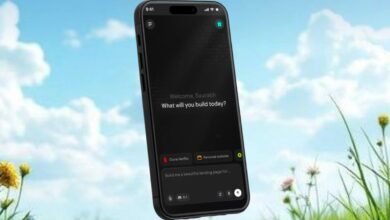Lovable AI Nears 8 Million Users, Targets Corporate Market

▼ Summary
– Lovable has grown from 2.3 million to nearly 8 million active users since July and sees 100,000 new products built daily on its platform.
– The startup has raised $228 million total funding and was valued at $1.8 billion this summer, with rumors of new investors seeking a $5 billion valuation.
– Despite traffic declining 40% as of September, the company maintains strong user retention with over 100% net dollar retention and has expanded to over 100 employees.
– Security is a priority, with Lovable implementing multiple security checks before deployment and hiring more security engineers to address vulnerabilities in the vibe coding sector.
– The platform serves a diverse user base, including over half of Fortune 500 companies and individual creators, and focuses on enabling rapid prototyping and human creativity rather than competing directly with AI giants.
The Stockholm-based AI coding platform Lovable is rapidly approaching 8 million users, a significant leap from the 2.3 million active users reported just a few months ago. CEO Anton Osika revealed the company now sees 100,000 new products built on its platform daily, signaling explosive adoption since its launch roughly one year ago. This growth trajectory is supported by substantial financial backing, with total funding reaching $228 million, including a recent $200 million round that valued the startup at $1.8 billion. Market speculation suggests new investors are considering a valuation as high as $5 billion, though Osika maintains the company is not currently capital constrained and declined to comment on fundraising strategies.
Despite achieving $100 million in annual recurring revenue earlier this year, Lovable has faced questions about the sustainability of the “vibe coding” trend. Recent analysis from Barclays and Google Trends indicates a 40% drop in traffic to leading platforms like Lovable and Vercel’s v0 since their peak earlier in the year. Analysts have questioned whether this signals a temporary lull or a broader market cooldown. However, Osika points to strong user retention metrics, including more than 100% net dollar retention, indicating that existing customers are increasing their spending over time.
Lovable evolved from GPT Engineer, an open-source tool created by Osika that quickly gained popularity among developers. He soon recognized a larger opportunity: empowering the vast majority of people who lack coding skills. “I woke up a few days after building GPT Engineer and realized we could fundamentally change how software is built,” Osika recalled. “I biked to my co-founder’s place, woke him up, and shared this vision.”
The platform’s user base is remarkably diverse. More than half of Fortune 500 companies now use Lovable to enhance creativity, while individual success stories include an 11-year-old in Lisbon who built a Facebook clone for his school and a Swedish duo generating $700,000 annually from a startup launched just seven months ago. Osika attributes this broad appeal to what he calls Swedish design sensibility, with users frequently reporting that “It just works.”
Security remains a critical concern for the vibe coding sector, particularly after recent incidents where apps built with similar tools leaked thousands of images along with sensitive data like GPS coordinates and user IDs. Osika acknowledged these challenges, noting that Lovable is aggressively expanding its security engineering team. The platform now runs multiple automated security checks before deployment, though Osika advises that sensitive applications, such as banking software, still require dedicated security experts, mirroring traditional development practices.
When questioned about competition from AI giants like OpenAI and Anthropic, whose models power Lovable but who also offer their own coding tools, Osika expressed a collaborative outlook. He believes the market is expansive enough for multiple successful players. “If we can unlock more human creativity and enable anyone with good ideas to build businesses, that achievement should be celebrated, no matter who facilitates it,” he stated. This perspective stands out in an industry known for rivalry, though Osika has occasionally engaged in light social media exchanges with competitors like Replit’s Amjad Masad.
Lovable’s mission, according to Osika, is to create what he calls “the last piece of software”, a comprehensive platform where product teams can handle everything from user research to deploying critical features through an intuitive interface. This aligns with the product leadership mantra “Demo, don’t memo,” which Osika says captures how companies are using Lovable to rapidly prototype ideas and gather user feedback without lengthy planning processes.
Despite the company’s hypergrowth and investor enthusiasm, Osika, a former particle physicist and the first employee at Sauna Labs before founding Lovable, appears grounded. Dressed casually in a beige T-shirt with his floppy hair framing his face, he seemed more interested in discussing European work culture than his rapid ascent in the tech world. He emphasized his commitment to a mission-driven team environment, pushing back against Silicon Valley’s intense hustle culture. “The best people on my team often have families and are deeply committed to our work, but they’re not working twelve-hour days, six days a week,” he noted, before adding with a smile, “Though it’s a startup, so they’re probably putting in more hours than most jobs.”
(Source: TechCrunch)


